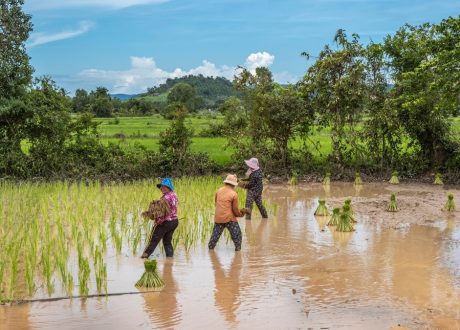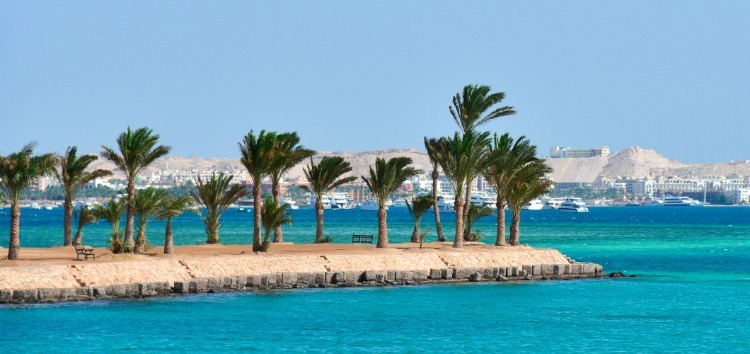
UNCTAD urges stronger action to help least developed nations tap into carbon markets
The United Nations Trade and Development (UNCTAD) urged during the 29th United Nations Climate Change ...

The European Bank for Reconstruction and Development (EBRD) is supporting digital transformation of the Suez Canal Economic Zone (SCZone), Egypt’s low-carbon hydrogen strategy and the establishment of a new Sector Skills Council to contribute to the recovery of the Egyptian tourism sector.
EBRD is supporting the efforts of the SCZone to develop an efficient, competitive and eco-friendly business environment that is attractive to international investors.
An attractive business hub will position the SCZone as a leading space for global trade, industries and services and will generate job opportunities for Egyptians.
Aiming to streamline administrative formalities and to fast-track the management of investor services, the SCZone authority has established a ‘one-stop shop’ for investors that is managed by its Investor Services Department.
The EBRD has been providing targeted technical support to the Suez Canal Economic Zone to deliver this autonomous, digital and interactive one-stop shop. The digital facilities will provide the speed and efficiency required to deliver investor services effectively, including licences and permits.
The first phase of the EBRD’s technical support has been successfully completed, with recommendations for the re-engineering and improvement of the first set of priority services. This will pave the way for the restructuring and full digitalisation of the remaining investor services.
The second phase will be launched during the first half of 2022. It will focus on the creation of a fully fledged digital and interactive one-stop service, enabling the SCZone administration to comprehensively manage current services and integrate new ones into the regulatory framework and digital platform.
In addition, the Bank has made recommendations on modernizing the regulatory framework and on bringing best practices from other well-established economic zones around the world. It has also assisted the SCZone with the design and establishment of an industrial park for small and medium-sized enterprises at Qantara West, next to the Suez Canal and surrounding facilities.
“The EBRD is delighted that our fruitful partnership with the SCZone is contributing to the successful delivery of an autonomous, digital and interactive one-stop shop. The SCZone’s project is a good example of how we can speed up the rollout of digital services,” said EBRD Vice President, Policy and Partnerships, Mark Bowman.
Yehia Zaki, Chairman of the SCZone, said “The launching of the second phase of cooperation with the EBRD aims to implement the improvement program and raise the level of performance of the one-stop shop for the SCZone. The cooperation will serve to regulate the services and special procedures provided to investors. It will provide technical support to improve the level of services by raising the skills and efficiency of staff at the one-stop shop, in addition to working on automating all services to simplify procedures and documents.”
The Covid-19 crisis has accelerated digital transformation across the EBRD regions, including the development of digital tools and sharing of knowledge about regulatory sandboxes. It has also accelerated the development of digital government services for firms to improve the ease and transparency of doing business.
At the end of 2021, the EBRD adopted its digital approach to advancing transition, which sets out a comprehensive framework for how the Bank will use its three instruments – investment, policy engagement and advisory services – to support digital transition in the economies where it operates.

EBRD is also helping Egypt to achieve its renewable energy potential and to transition to a greener economy by assisting in the development of a national low-carbon hydrogen strategy.
Hydrogen is one of the decarbonized fuels of the future. It can significantly contribute to the energy transition while unlocking additional benefits from renewable power generation.
The Bank signed a memorandum of understanding (MoU) with Egypt’s Ministry of Electricity and Renewable Energy and Ministry of Petroleum and Mineral Resources to establish a framework for assessing the potential of low-carbon hydrogen supply chains.
The Bank’s assessment will include mapping the current and future expected international supply and demand of the hydrogen market, analyzing existing and potential hydrogen production in Egypt and valuing the storage, conversion and transportation of hydrogen and its derivatives.
The EBRD will also help to conduct a regulatory analysis and assessment of the changes needed to support the development of hydrogen supply chains in Egypt while ensuring the safety, reliability, competitiveness and sustainability of supply.
The assessment will provide guidelines for the country’s low-carbon hydrogen strategy, promoting the sustainable development of hydrogen as a decarbonized fuel for climate change mitigation, while ensuring cost effectiveness and identifying potential areas for investment.
Accelerating progress on achieving Egypt’s national development strategy, with the Sustainable Development Goals (SDGs) at its core, Minister of International Cooperation Rania Mashat emphasized that the country was committed to transitioning to an inclusive and green economy. Egypt will host the COP27 climate conference towards the end of the year.
“Utilizing low-carbon hydrogen is a key step towards mitigating climate change as the country moves to using clean and renewable energy,” Minister Mashat said.
Mark Bowman, EBRD Vice President for Policy, said “We are very proud to contribute to Egypt’s future national low-carbon hydrogen strategy, which is in line with the Bank’s commitment to mitigating climate change where it invests. The Bank has been a strong supporter of renewable energy development in Egypt, providing policy advice, technical assistance and financing. Our aim is to back the country in achieving another milestone.”
EBRD is also supporting the establishment of a new Sector Skills Council (SSC) in Egypt, a multi-stakeholder platform aiming at fostering more resilient and inclusive human capital in the hospitality and tourism sector.
On 5 March 2022, the EBRD signed a memorandum of understanding to establish the SSC with the Ministry of Tourism and Antiquities (MOTA) and the Egyptian Tourism Federation (ETF), with support from the EBRD Shareholder Special Fund and the Swiss State Secretariat for Economic Affairs (SECO).
This new public-private partnership and policy dialogue platform will develop skills-gap analyses, skills development strategies, qualification frameworks and occupational skills standards. It will also provide market-relevant training to the hospitality and tourism sector, thus helping to develop a skilled labor market and opening up greater access to employment for those working in the tourism-related industries. The tourism sector is a fundamental contributor to the country’s economic growth.
The partners will develop a clear mandate and operational plan for the SSC, along with a list of the 20 most pertinent occupational standards for the tourism sector. Capacity-building support will be provided to SSC partners in government, enterprise and training provision.
Representatives from various tourism and hospitality sectors, such as hotels, restaurants and tour guides, will play a leading role in the SSC to ensure market relevance and strong private-sector input into skills governance.
To boost the recovery of Egypt’s tourism sector in the wake of the Covid-19 pandemic, the EBRD also launched the tourism recovery assistance package in partnership with the World Tourism Organization. The package will support the measurement and monitoring of Covid-19 impacts on the tourism sector, the development of tourism recovery incentive programs and the review of operational protocols on safety, hygiene and security. As part of the package, tailor-made training programs have been developed alongside institutional strengthening measures to better coordinate the recovery and bolster the growth of Egypt’s tourism.
The EBRD has recently supported access to market-relevant skills and employment opportunities with a new state-of-the-art culinary workshop at the German Hotel School in El Gouna, in partnership with the Sawiris Foundation for Social Development, funded by the EBRD’s Southern and Eastern Mediterranean Multi-Donor Account (SEMED MDA).
EBRD is playing a pivotal role to enhance Egypt’s efforts to achieve the Sustainable Development Goals.
The United Nations Trade and Development (UNCTAD) urged during the 29th United Nations Climate Change ...
About 140 oil and gas companies have committed to credibly measuring and reducing methane emissions ...
Egypt’s Minister Rania Mashat has witnessed the launch of two international initiatives on sustainable energy ...


اترك تعليقا